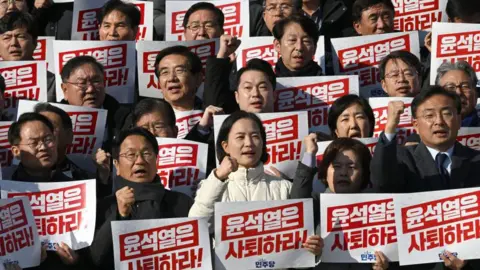
South Korea’s president shocked the country on Tuesday night when, out of the blue, he declared martial law in the Asian democracy for the first time in nearly 50 years.
Yoon Suk Yeol’s drastic decision – announced in a late-night TV broadcast – mentioned “anti-state forces” and the threat from North Korea.
But it soon became clear that it not been spurred by external threats but by his own desperate political troubles.
Still, it prompted thousands of people to gather at parliament in protest, while opposition lawmakers rushed there to push through an emergency vote to remove the measure.
Defeated, Yoon emerged a few hours later to accept the parliament’s vote and lift the martial law order.
Now, he faces the prospect of possible impeachment and even expulsion from his own party.
Advertisement